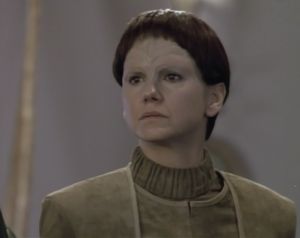| |||||||||||
| |||||||||||
|
Spoiler-free notes: This is an important episode, as it attempts to blaze the same kind of social trail TOS did by putting extremely controversial and current social issues in the forefront. Homosexuality and gender politics have been largely ignored thus far in Star Trek, and though there have been stories that have come close to these topics--"The Host" springs to mind--the writers seem to have been deliberately skirting them. Here, though, they confront sexuality head-on, making the parallels between Soren's situation and that of people here and now very obvious through Soren's many conversations, climaxing in her rousing final speech (which reminds me of Shylock's "prick us do we not bleed" monologue from The Merchant of Venice). The final result is a talky, philosophical episode that takes cues from Ursula Le Guin's The Left Hand of Darkness, a seminal work of science-fiction that features the politics of an alien race that has no gender (though there are some pretty stark differences between that story and this one). It's also similar to TNG's earlier episode, "Half a Life," in that it deals with a moral conflict with peaceful alien cultures and has a similar resolution. On the whole, it is successful in what it emphatically tries to do, though I don't think I ever fully appreciated it before this rewatch. One of the problems of the episode is that the J'naii are all obviously played by women. Androgyny is incredibly hard to pull of well, so I don't envy the producers of the episode their task. Having said that, though, I feel like they could have tried harder to make the J'naii look and act less female. Jonathan Frakes, the actor who plays Riker, has gone on record saying that he wishes they had cast a male in the role of Soren, so that the episode's message would have been more effective. I agree with the sentiment, but I think Soren being more female than male makes sense from a narrative standpoint, as she identifies as female. Then again, if they'd have cast a man and made him seem more female than the rest of the J'naii, that would have been bold. Another problem is in the ending, which pretty effectively unravels the message of the show, making the moral ambiguous. Again, from a narrative, episodic television standpoint, it is the only ending that makes sense, as having Riker and Soren continue their relationship into the future of the show would have been beyond problematic, especially if it came with Riker's violation of the Prime Directive being undeniable. However, showing Soren happy and free and knowing that she'll probably live the rest of her life that way, if you take the allegory to its conclusion, implies that homosexuals and other gender-confused people would be better off if they could be reprogrammed. I'm quite certain this is not a message Star Trek would be comfortable with. Despite these problems, it's still a strong episode. For one thing, it's an excellent treatment of Riker. For an episode that deals so heavily with sex and emotion, Riker is the only logical choice as protagonist. However, instead of just exploiting his overt sexuality, the story shows a more careful and vulnerable side to Riker's personality. They don't cut away when Soren's prodding becomes awkward--which forces the writers to put a believable effort into making the relationship work--and they show Riker going to Troi when his feelings for Soren become all too real. The climax hinges on Riker being willing to sacrifice his career and his reputation for love, and it would not have worked had Riker's relationship followed a more typical tack of showing Riker being overly flirtatious with an alien chick. It's actually pretty remarkable that the climax works, given that many earlier attempts to have a single episode relationship between a regular cast member and a guest star have failed so spectacularly. Riker and Soren have a genuine chemistry, and since the episode almost never leaves Riker's point of view, there is enough time for it to seem reasonable for the audience. I have been very critical of the show for its heavy-handed melodrama, but this is an episode that absolutely calls for it and manages to pull it off. Null space is encountered again in VOY's "The Voyager Conspiracy." It's ironic that Worf is the crewmember who shows the most discomfort at the idea of Riker and Soren getting together, seeing as how he will eventually marry Jadzia Dax, a Trill who, in the past, had been a male. At least Worf gets to redeem himself in the end of this episode by going to the planet with Riker, even though he seems to have issues with the gender politics that drive him there. | |||||||||||
|
| |||||||||||
| |||||||||||
|
Copyright ©2012 e. magill. All rights reserved.
|

